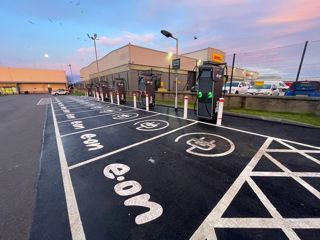A new initiative aims to help local electricity networks cope with the increased demand posed by charging electric vehicles by opening up data from local substations.
Currently, electricity network operators do not have enough information about how much spare capacity there is on local electricity networks.
This makes it difficult to know whether a cluster of EVs charging at peak times will push the demand over the limit.
The OpenLV project will open up data from local substations so that distribution network operators and third parties such as businesses and academia will have more information about whether networks can cope with rising EV numbers.
If the data highlights a potential capacity issue, then other initiatives could be implemented – such as smart charging, vehicle to grid technology, energy storage, or joining networks together – in preference to more costly and disruptive infrastructure reinforcement works.
The OpenLV project, led by project partners Western Power Distribution and EA Technology, is inviting the submission of ideas for how data from local electricity networks could be used to develop new apps – to help manage the charging of increasing numbers of EVs, as well as for other uses.
At a time when the automotive and energy sectors are collaborating increasingly closely, the car industry and EV charging companies are invited to get involved in the OpenLV project.
Mark Dale, innovation manager at Western Power Distribution, said: “The OpenLV project is making local electricity network data ‘open access’ for the first ever time. This presents a great opportunity for smart thinking and innovation.
"We’re inviting people, ranging from community groups to industry stakeholders, to come up with novel ideas for apps that can make use of this data.”
Richard Potter, EA Technology’s OpenLV project manager, added: “We’re at an exciting point where different sectors such as automotive, energy and IT have opportunities to come together to help the UK move towards a smart electricity grid.
"Innovative ideas about apps that could offer people benefits are welcomed from all sectors, as well as from the energy industry itself.”




















Login to comment
Comments
No comments have been made yet.